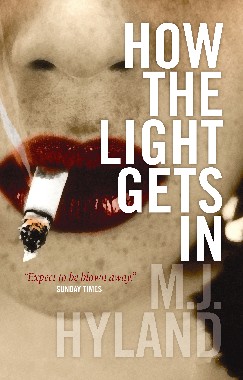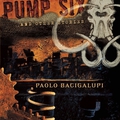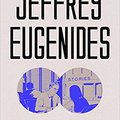M. J. Hyland: How the Light Gets In

I was wandering around aimlessly in one of my favorite bookstores a couple of weeks ago when I came across this novel. I had never heard about it before, but I loved its title and cover from the very first moment. I checked what the novel was about and read the selections from the favorable reviews on the back cover. Of course, according to these quotes, every single novel is masterful, exciting, heartbreaking, unsettling, beautifully written, irresistible, breathtaking or any arbitrary combination of these, and sometimes I’m still naive enough to believe what is written on the cover. However, I didn’t buy the book on the spot, but decided to keep it in my mind and buy it later. But then I kept thinking about it continuously, so a couple of days later I went back to the shop and bought it.
It’s always a great pleasure for me to read a book I know absolutely nothing about, and which hasn’t been read by any of my friends or acquaintances either. I always feel that these books aren’t yet spoiled by any previous opinions and prejudices, neither my own, nor those of others – so they still carry the inherent possibility to become one those books that change my life. No wonder then that I started to read How the Light Gets In with great curiosity and excitement, and as it happened, I only needed to get as far as the second page to know for sure that this was indeed a book I was going to love – and one that I’m bound to re-read a hundred times later.
You may guess from the previous paragraphs that this isn’t going to be one of my most objective and analytical posts. However, I don’t want to fill this post only with my incoherent ramblings, so let me first tell you what this novel is about.
(By the way, I’m not sure about the origins of the title, but I searched the web and found that Leonard Cohen’s song „Anthem” contains the following lines: „There is a crack in everything // That’s how the light gets is”. It may just be possible that Hyland refers to this song with the title.)
How the Light Gets In tells the story of sixteen-year-old Lou, a girl with an exceptionally high IQ from Sydney, Australia. She lives with a family of misfits who mainly live on the dole. Naturally, Lou wants out, so when she gets a chance to spend a year in the US as an exchange student, she grabs the opportunity immediately. She considers this year as her big (or only) chance to change her life and herself as well. Arriving in the US, she is greeted by her host family, the lovely, healthy and well-off Hardings who try to make sure that the unlovely, uncouth, sulky, insomniac Lou finds her place in their Perfect American Life as soon as possible.
Of course this is not too easy for a girl like Lou, and she gets entangled in every kind of difficulty imaginable in a life of a sixteen-year-old girl: she smokes, drinks, does drugs, goes out with the wrong guys, doesn’t go home in time, steals and lies – and after a while it seems obvious that her dreams about a new life may never come true.
Have I read a lot of books about such things? Of course I have. What is so good about this novel then? Simply everything. For me How the Light Gets In is virtually perfect in terms of themes, execution and style. The novel deals with such diverse topics as, for instance, the unattainability of the American Dream; the impossibility (or extreme difficulty) of fitting in; the identity crisis of teenagers; and teenage loves, desires and sexual relations – and miraculously, Hyland manages to fit all these topics into her novel, without making it overburdened or didactic.
And Lou tells her story exactly in that clever, sarcastic, hostile style which can be expected from a sixteen years old, intelligent, naive, unhappy, insecure girls. In the whole novel I only felt once, during one of Lou’s ruminations about alcoholism, that the words don’t sound that very authentic from the mouth of a teenage girl, and for a second I was afraid that the novel might suddenly turn into a didactic self-help book, but to my immense relief, this didn’t happen.
One of reviews quoted in the book claims that Lou Connor is a female equivalent of Holden Caulfield. I think that comparing this novel to The Catcher in the Rye is both inevitable and correct. As The Catcher in the Rye has become such a classic, it only seems natural that it’s mentioned in connection with every new novel dealing with teenage angst. And in the case of How the Light Gets In the comparison indeed seems apt: Lou’s behavior, her great desire to be loved, her critical view of the world, her penchant for hasty judgment and sometimes even her vocabulary reminded me of Holden. And apart from Lou herself, there are several episodes and motifs in the novel which seem to be references to Salinger’s novel. For instance, Lou’s relationship with the Russian exchange student Lishny bears strong reminiscences to the relations between Holden and Jane Gallagher in The Catcher in the Rye. (By the way, „Lishny” seemed such a strange name to me that I felt compelled to dig up its meaning. Actually, the word means „superfluous”, „futile”. Anyway, as Hyland herself doesn’t explain about the word in the novel, I don’t want to analyze the possible implications of this name either.)
I read it more than once that one should read The Catcher in the Rye as a teenager, as it’s impossible to grasp its atmosphere and meaning if you first read it as an adult. Actually, I was around 16 when I first read The Catcher in the Rye, and re-read it many times since then, and it always proved a compelling, cathartic book for me. Still, I don’t know how I would have reacted if I had first read it as an adult. As I mentioned, How the Light Gets In indeed resembles The Catcher in the Rye in many respects, just as Lou resembles Holden. If we examine Lou’s character more closely, she is nothing more than a not too amiable, whining teenager who would like to change the world and herself in it – but we may surmise that she will soon grow up, learn how things really are, and be forced to conform to the norms of society.
So I might as well feel that Lou is only a pretty irritating teenager, and I have nothing to do with her, as I’m way past her age and her petty problems. But as it happens, I can very much feel for Lou, I can understand her struggles, and my heart nearly breaks whenever I see how she steps on step closer to ruining her life completely.
There are two possibilities here. It might be that deep down I’m still a teenager, this is why I can understand Lou’s story so much. Or it might be that this an excellent novel about a sixteen-year-old which is not only meant to be read by other sixteen-year-olds. I believe the second of these possibilities to be the case.





